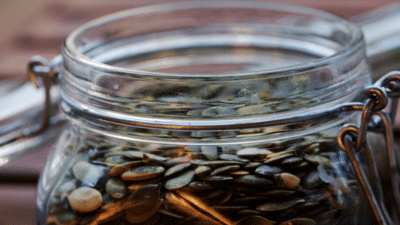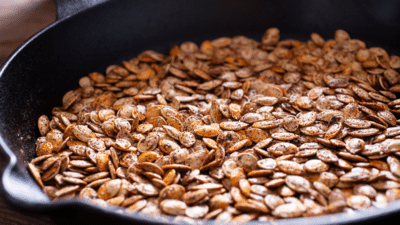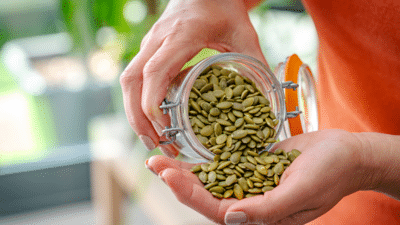Pumpkin seeds, also called pepitas, are small but surprisingly rich in nutrition. A 28-gram handful gives around 7 grams of protein, 13 grams of mostly healthy fats, nearly 5 grams of fibre and a good amount of minerals such as magnesium, zinc, phosphorus and iron. The way you prepare them can change their flavour, texture and even how well some of those nutrients are absorbed. Scroll down for a simple look at the trade-offs and easy steps, so you can decide what works best for you...
Soaked seeds - What it does, and how to do it

Soaking pumpkin seeds helps lower their phytic acid content, a natural compound that can sometimes make it harder for the body to absorb minerals. If you leave the seeds in cool water overnight, anywhere from six to twelve hours, they soften and swell slightly. This makes them easier to chew and blend smoothly into chutneys, pestos, smoothies or spreads. Many people also find that soaked seeds feel lighter on the stomach compared with eating them dry.
How to soak
To soak pumpkin seeds, rinse them well and cover with about four times their volume of water. Leave them at room temperature for six to twelve hours, during which they soften and swell slightly. Once ready, drain and rinse again before eating. You can use them straight away or keep them in the fridge - but it’s best to finish them within a day or two. Because of the extra moisture, soaked seeds should never be left out at room temperature, as they spoil quickly.
Limitations - Soaked seeds don’t keep well and aren’t easy to carry around as well. They’re best eaten fresh, ideally within a few hours of soaking.
Roasted seeds - What it does, and how to do it

Roasting concentrates flavour, creates crunch and greatly extends shelf life compared to soaked seeds. Light, dry roasting preserves most protein, fibre and healthy fats while giving the seeds a usable, ready-to-eat form that’s easy to sprinkle or snack on.
How to roast
To roast pumpkin seeds on the stovetop, warm a heavy pan on medium heat and scatter the seeds in a thin layer. Stir or toss them often so they toast evenly without catching. In about five to seven minutes, they’ll turn lightly golden and release a nutty smell, that’s the cue to take them off the flame. Let them cool fully before storing in an airtight container. This simple dry roast keeps the seeds crisp for weeks if you leave them in a cool, dry spot. Just don’t overdo the heat - as it can damage some of the more delicate nutrients. And instead of buying salted or flavoured packs, a light sprinkle of seasoning at home is usually healthier and tastes fresher too.
Nutrient trade-offs - a realistic view

Soaking pumpkin seeds makes it easier for the body to take in minerals and also supports digestion. Roasting, on the other hand, gives them that crunch and helps them stay fresh for weeks. It’s true that high heat can lower some delicate nutrients like certain forms of vitamin E, but a gentle roast can actually unlock other helpful antioxidants. In the bigger picture, these small shifts don’t matter much unless pumpkin seeds are the only food you’re depending on. For most people who eat a regular, balanced diet - both soaked and roasted seeds are equally nourishing and worth including.
Practical recommendations
• Use soaked seeds when you want softness and better mineral uptake, ideal for blends, spreads and recipes where digestion matters.
• Use roasted seeds when you want crunch, flavour and portability, ideal for snacks and garnishes.
• If you want a compromise, a light, short dry roast preserves texture and keeps seeds shelf-stable while still retaining much of their original nutritional value.
• Avoid highly salted commercial mixes if sodium is a concern.
Takeaway
Well, there is no right answer when it comes to which is better. Soaking can make the seeds easier to digest and help the body take in more minerals as well while roasting gives them flavour, crunch and a longer shelf life. The simplest way is to go with what you feel like - soak the seeds when you want something light and easy on the stomach and roast them when you’re in the mood for crunch and flavour.
Soaked seeds - What it does, and how to do it
Soaking pumpkin seeds helps lower their phytic acid content, a natural compound that can sometimes make it harder for the body to absorb minerals. If you leave the seeds in cool water overnight, anywhere from six to twelve hours, they soften and swell slightly. This makes them easier to chew and blend smoothly into chutneys, pestos, smoothies or spreads. Many people also find that soaked seeds feel lighter on the stomach compared with eating them dry.
How to soak
To soak pumpkin seeds, rinse them well and cover with about four times their volume of water. Leave them at room temperature for six to twelve hours, during which they soften and swell slightly. Once ready, drain and rinse again before eating. You can use them straight away or keep them in the fridge - but it’s best to finish them within a day or two. Because of the extra moisture, soaked seeds should never be left out at room temperature, as they spoil quickly.
Limitations - Soaked seeds don’t keep well and aren’t easy to carry around as well. They’re best eaten fresh, ideally within a few hours of soaking.
Roasted seeds - What it does, and how to do it
Roasting concentrates flavour, creates crunch and greatly extends shelf life compared to soaked seeds. Light, dry roasting preserves most protein, fibre and healthy fats while giving the seeds a usable, ready-to-eat form that’s easy to sprinkle or snack on.
How to roast
To roast pumpkin seeds on the stovetop, warm a heavy pan on medium heat and scatter the seeds in a thin layer. Stir or toss them often so they toast evenly without catching. In about five to seven minutes, they’ll turn lightly golden and release a nutty smell, that’s the cue to take them off the flame. Let them cool fully before storing in an airtight container. This simple dry roast keeps the seeds crisp for weeks if you leave them in a cool, dry spot. Just don’t overdo the heat - as it can damage some of the more delicate nutrients. And instead of buying salted or flavoured packs, a light sprinkle of seasoning at home is usually healthier and tastes fresher too.
Nutrient trade-offs - a realistic view
Soaking pumpkin seeds makes it easier for the body to take in minerals and also supports digestion. Roasting, on the other hand, gives them that crunch and helps them stay fresh for weeks. It’s true that high heat can lower some delicate nutrients like certain forms of vitamin E, but a gentle roast can actually unlock other helpful antioxidants. In the bigger picture, these small shifts don’t matter much unless pumpkin seeds are the only food you’re depending on. For most people who eat a regular, balanced diet - both soaked and roasted seeds are equally nourishing and worth including.
Practical recommendations
• Use soaked seeds when you want softness and better mineral uptake, ideal for blends, spreads and recipes where digestion matters.
• Use roasted seeds when you want crunch, flavour and portability, ideal for snacks and garnishes.
• If you want a compromise, a light, short dry roast preserves texture and keeps seeds shelf-stable while still retaining much of their original nutritional value.
• Avoid highly salted commercial mixes if sodium is a concern.
Takeaway
Well, there is no right answer when it comes to which is better. Soaking can make the seeds easier to digest and help the body take in more minerals as well while roasting gives them flavour, crunch and a longer shelf life. The simplest way is to go with what you feel like - soak the seeds when you want something light and easy on the stomach and roast them when you’re in the mood for crunch and flavour.
You may also like

'Pro red-terror': BJP slams Congress, CPI over 'naxal mukt Bharat' questions; calls them 'tudke tudke gang'

J-K: Indian Army's Romeo Force holds ex-servicemen interaction, medical camp in Poonch

'Room politics' in Bollywood: Actor worth Rs 2,500 crore was once given a smaller room than co-star after his movie flopped

Samsung Group union coalition to demand reform of bonus system

Rape charges against influencer Andrew Tate dropped; claims he's 'the most' mistreated man






